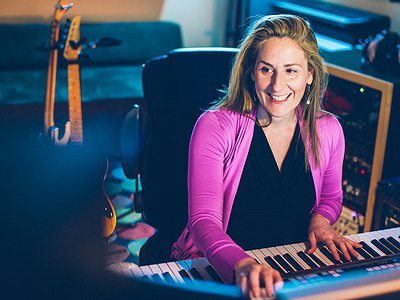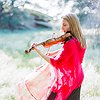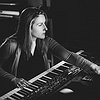Name: Ronit Kirchman
Nationality: American
Occupation: (Film Music) Composer, Songwriter, Multi-instrumentalist
Website / Contact: If you enjoyed this interview with Ronit Kirchman and would like to find out more about her work, her website is a great place to start.
When did you start composing film music - and what or who were your early passions and influences? What what is about music and/or sound that drew you to it?
I started composing film music toward the end of my graduate studies at CalArts. My academic focus was on compositional systems, algorithmic composition, programming of live interactive software instruments, and various forms of improvisation. I was attracted to the potentially wide reach and scope of films.
After moving to California, I spent some time learning the film music workflow, and got the opportunity to score my first short film, which in turn yielded more opportunities. I received the Sundance Composers Lab Fellowship pretty early on, and that was really affirming for me, and also put me in touch with a wonderful larger community of working artists.
For me, music has always been a first language. I was writing my first tunes in preschool, and I’ve always thought and dreamed in music. In my experience, the magic of music and sound is in its mixture of physical resonance, emotional impact, intelligent organization, and ethereal nature, moving through time and shaping time. It’s powerfully embodied and also very mysterious and connected to subtext and subconscious movement. Music communicates in a way that words cannot and has the authenticity of touch.
It’s hard to encapsulate all of my early passions and influences. The moment I mention an artist, I feel keenly aware of all those I haven’t mentioned! I responded immediately to orchestral composers who worked coloristically, like Debussy, Ravel, and Berlioz. Even as a kid, I loved 20th-century composers who pushed the edges of academic thinking, like Schoenberg and Cage. I loved the timeless structures of Bach. Rock bands and artists like U2, Prince, Madonna, PJ Harvey, Paul Simon. Country blues artists like Robert Johnson and Lightnin’ Hopkins. Songs where the rhythms were irregular because they followed the meaning and the moment, instead of a pre-set structure. John Coltrane. Stephane Grappelli. Ella Fitzgerald. Cecil Taylor. Animated musicals. Modern dance, fine art, and poetry were big influences.
I received a full classical education as a violinist and started playing at age four, but I was also influenced by informal childhood experiences like playing jazz and folk tunes with my dad at the piano, at home and at family gatherings. As a child I was curious about the relationships between notation, performance, and recording; how music is put together among people; and what the written notation can and can’t express. What is it that defines a piece of music?
As a composer, my focus on film music really expanded as I began to practice that art form. I was particularly inspired by the close relationship of Nino Rota and Fellini, and the way that music was part of their process throughout, not just at the end of post-production. That close artistic partnership between composer and director made a lot of sense to me.
For most artists, originality is first preceded by a phase of learning and, often, emulating others. What was this like for you? How would you describe your own development as an artist and the transition towards your own voice? What is the the relationship between copying, learning and your own creativity?
I don’t think of originality as something that an artist transitions into after a period of emulation. In my experience, the process of developing as an artist is a continual one of discovering one’s essential voice through expressive practice. That essence is something that goes beyond concrete elements of style, even though it can generate new aspects of style. It’s there from the beginning, and it evolves and expands as you seek to engage and shape your vision.
Of course, we naturally learn from everything around us, observing and mirroring patterns. Self-definition happens in a relational way. We each have so many influences on our vocabulary, syntax, and conceptual frameworks. We’re deeply imbued with the imprints of overlapping cultures. The aim in building my experiential toolkit is not to copy other practitioners, but to join a deep human tradition of musicmaking and enjoy a richer palette through which to bring my creative self to material expression, when the time comes to speak something new.
I think the most useful distinction here is the compositional intention. When you sit down to write, are you connecting to your creative essence and to humanity at large, to something that you feel you have to say? Or are you coming from a place of “I am going to write a piece that sounds like so-and-so”? It can be a good exercise to write “in the style of”, but I have always felt, even when writing in very specific stylistic categories, that the real project is connecting to the creative source and bringing one’s individual inspiration to the collective conversation.
What were your main compositional challenges when starting out as a film composer and how have they changed over time?
Probably the biggest challenge when I was starting out on smaller projects was realizing my ideas to my satisfaction within a very limited budget. It helped that I was genuinely interested in all the parts of the process, and enjoyed wearing all the hats – composing, playing, programming, orchestrating, engineering, etc. So, it had the effect of honing my skills in a variety of technical areas.
Another challenge was that while the technology was basically there to do what was needed, the processing power and software design wasn’t yet where it is now. That meant having to spend extra time optimizing software and system setups, and it took more effort to get the power, flexibility, and sound that many of us now take for granted.
These days, as my budgets are larger and the technology is abundantly powerful, I think some of my focus has shifted to team-building, designing effective workflows on a larger scale, and extending the base of my music-making operation outwards so that I can accommodate more projects.
What, to you, are the main functions and goals of soundtracks and film music and how would you rate their importance for the movie as a whole? How do you maintain a balance between, on the one hand, artistic integrity and sticking to your creative convictions and, on the other, meeting the expectations of the director?
Music in film functions as an integrated part of the cinematic experience. It is a form of both text and performance. How it integrates and what it does within the world of a film can vary, especially if we look at experimental films which challenge formal conventions and engage aesthetic questions that a conventional narrative doesn’t allow.
Within a traditional narrative storytelling format, the music (if it’s working well) enhances and deepens the story, and provides contrast and perspective. In an action movie, it is crucial for creating energy and pacing. In a nuanced drama, it can speak the subtext and create a unique emotional language. In a comedy, it can help a joke to land. Music can also help to bridge genres and the audience’s expectations, because it is so fluid. Music is a big contributor to the tone and attitude of a film, providing continuity and helping to immerse and connect the audience. There are great films that use minimal to no score, but I believe that music is very important in the majority of cases in providing some sort of supportive framework for the narrative.
Film scoring is a collaborative art form, and as in any field, the quality of the experience depends on the people involved. I don’t think it’s at all a binary situation where your creative convictions and artistic integrity are in opposition to what a director wants. Film scoring is defined by its relationship to a larger context. Your job is to bring your talents to the story and to work with the director, producers, and everyone involved in a harmonious way.
As a composer working on a film, your musical vision doesn’t exist in a vacuum. The story is the context, and it brings out music that is unique to that world. I love working in that context, because inevitably I discover parts of my musical language and expression that were previously unexplored.
In my experience, if revision notes are intelligently constructed, they usually help to shape better cues. A good director will help the best approach to come into focus. There are different ways to do that. Some directors are very hands-off about musical details, and some are more particular. You have to hope that the director has hired you because he or she wants to hear what you have to bring to the table.




